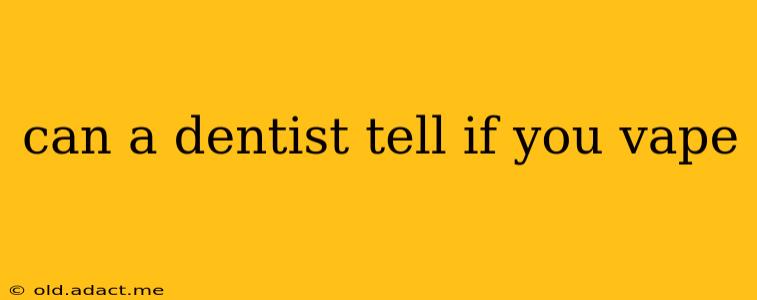Can a Dentist Tell if You Vape?
While a dentist might not be able to definitively prove you vape in the same way a blood or urine test can, several oral indicators can raise their suspicions. The effects of vaping on oral health are becoming increasingly well-understood, and astute dentists are noticing patterns in patients who use e-cigarettes. Let's delve into the specifics.
What Oral Signs Might Indicate Vaping?
Many of the oral effects of vaping mirror those of smoking traditional cigarettes, although the severity and specific manifestations might differ. A dentist might observe:
-
Dry Mouth (Xerostomia): Vaping can significantly decrease saliva production, leading to a dry mouth. This is a common complaint among vapers and is easily detectable during a routine exam. Dry mouth increases the risk of cavities and gum disease.
-
Gum Disease (Gingivitis/Periodontitis): Studies have linked vaping to an increased risk of gum disease. Inflammation, bleeding gums, and receding gum lines are all potential signs a dentist might notice. The specific compounds in e-liquids can contribute to this inflammation.
-
Changes in Taste and Smell: Certain flavorings in e-liquids can temporarily alter taste buds, a change a dentist might pick up on during a conversation or routine check-up, although this is less definitive than other signs.
-
Oral Thrush (Candidiasis): The dry mouth caused by vaping can create a favorable environment for the growth of oral yeast infections like thrush, presenting as white patches on the tongue or inner cheeks.
-
Irritation or Inflammation of the Oral Tissues: Some e-liquids contain irritants that can cause inflammation of the gums, tongue, or other soft tissues in the mouth.
Can a Dentist Diagnose Vaping Based on Oral Health Alone?
No, a dentist cannot definitively diagnose vaping solely based on oral findings. Many of the oral health issues listed above can be caused by other factors, including poor oral hygiene, genetics, medications, or other health conditions. However, the presence of multiple oral health problems in conjunction with other clues (like the patient's disclosure or the smell of vaping residue on clothing) might raise a dentist's suspicion.
How Can Vaping Affect Your Teeth?
Vaping isn't harmless to your teeth. While it doesn't contain the same tar as cigarettes, the lack of saliva, the potential for chemical irritation, and the increased risk of gum disease can all negatively impact dental health. This can lead to:
- Increased risk of cavities: Dry mouth reduces the mouth's natural ability to neutralize acids produced by bacteria, increasing the risk of tooth decay.
- Gum disease: As mentioned, vaping is linked to an elevated risk of gingivitis and periodontitis.
- Tooth staining: While not as significant as with traditional cigarettes, some e-liquids can stain teeth.
What Should You Do If You Vape?
If you vape and are concerned about its effects on your oral health, it’s crucial to maintain excellent oral hygiene. This includes:
- Brushing and flossing twice daily: This helps remove food particles and plaque.
- Using an alcohol-free mouthwash: This can help combat dry mouth.
- Regular dental checkups: This allows your dentist to monitor your oral health and identify potential problems early.
- Considering quitting: Quitting vaping is the best way to protect your oral health. Your dentist can provide resources and support if you're ready to quit.
In conclusion, while a dentist can't definitively confirm vaping through a simple examination, various oral symptoms can suggest a potential link. Maintaining good oral hygiene and regular dental checkups are crucial for mitigating any potential negative effects. Open communication with your dentist about your lifestyle choices will ensure you receive the best possible care.
